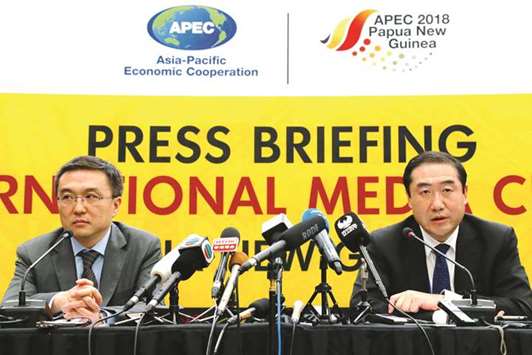Asia-Pacific leaders failed to reach a consensus on the wording of a communique after two days of talks in Papua New Guinea, reflecting heightened tensions fuelled by a trade war between the US and China.
Speaking to reporters at the end of the Asia-Pacific Economic Co-operation summit, Canadian Prime Minister Justin Trudeau said negotiations had been difficult between the 21 economies. The leaders have never previously failed to agree on a statement since they began meeting annually in 1993.
“I don’t think it will come as a huge surprise that there are differing visions on particular elements in regard to trade,” Trudeau told reporters yesterday. “That prevented there from being a full consensus on the communique document.”
A US official familiar with the talks said China balked at some language related to trade.
At issue was a pledge by the governments to fight “all” unfair practices, which China objected to including in the statement, said the official, who asked not to be identified as the discussions were private.
The 20 other nations endorsed the language, the official said.
The growing US-China trade dispute loomed large at the summit in Port Moresby, as Vice President Mike Pence and President Xi Jinping traded barbs in their back-to-back speeches on Saturday.
Papua New Guinea’s Prime Minister Peter O’Neill said the issue of World Trade Organisation reforms was the main cause of disagreement among leaders. Nations have been calling for key changes at the WTO, including around dispute settlement, while the Trump administration has threatened to pull out of the body if it doesn’t treat the US more fairly.
The disagreement among Apec leaders wasn’t “only the US and China,” O’Neill told a scrum of reporters, who followed him out of the closing news conference after he initially didn’t take questions. “There are other members who expressed opinions” about WTO reforms, he said.
The prime minister said a formal Apec statement will be released at a later date.
The tensions reportedly boiled over as summit host Papua New Guinea tried to draft the communique. Agence France-Presse news agency said that Chinese officials attempted to “barge” into the office of the country’s foreign minister to influence the document. Chinese officials denied the report, which said police had to be called.
“The incident that you mentioned is a rumour spread by some people with a hidden agenda,” said Wang Xiaolong, director-general of the Department of International Economic Affairs at China’s foreign ministry.
Wang said issues related to the WTO “have to be discussed and decided on a broad based process beyond this region.”
In his speech, Xi said implementing tariffs and breaking up supply chains was “short-sighted” and “doomed to failure.” He called for a stronger WTO and defended his signature Belt-and- Road Initiative, saying it’s “not a trap as some people have labelled it.”
Pence, meanwhile, warned nations against taking Chinese loans, saying the US “doesn’t drown our partners in a sea of debt” nor offer “a constricting belt or a one-way road.”

Wang Xiaolong, director general of the Department of International Economic Affairs at the Chinese Ministry of Foreign Affairs, listens to questions with Zhang Shaogang, the director general of the International Department of the Chinese Ministry of Commerce, during a media conference at the end of the Asia Pacific Economic Co-operation forum, in Port Moresby, Papua New Guinea, yesterday. Apec leaders failed to reach a consensus on the wording of a communique after two days of talks, reflecting heightened tensions fuelled by a trade war between the US and China.
